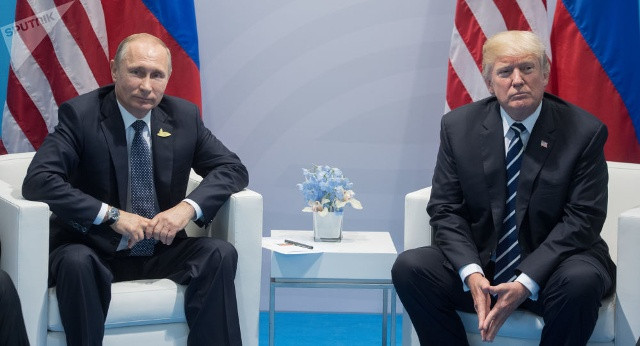When NATO considers Russia the number one threat
The Russia-NATO confrontation is currently in its biggest escalation phase since the Cold War. The relationship between Russia and the US has just begun to develop, but in the military-political bloc that has traditionally been under the direction of the US, there are hawks hovering overhead...
At the Federal Security Council, when referring to NATO's expansion on the eastern flank, Russian President Vladimir Putin stated: The alliance constantly tries to provoke Russia, seeks to draw Moscow into a confrontation and always tries to interfere in the country's internal affairs.
President Vladimir Putin said the expansion of the Western military bloc had been happening for some time, but now member states had found a larger purpose for their expansion.
He noted that NATO's admission of new members was aimed at containing Russia, which is considered their main security threat. The Russian leader also stressed that, in fact, since the first NATO Summit in 1989 until the recent NATO Summit in July 2016 in Warsaw, the main task of the Alliance was to contain/contain the Russian Federation.
Political analyst Aleksey Jivov explains: "The first thing to remember is the commitment of many NATO allies, led by the US, to make a bargain with Germany to ensure that NATO does not expand towards Eastern Europe. President Putin has mentioned many times before that the US and its allies violated the agreements that followed.
 |
| Photo: Sputnik |
Therefore, no documents signed between the Soviet Union and NATO, or between NATO and Russia, regarding the neutrality of Eastern Europe, exist. The 1990 transcripts of the negotiations recorded all the commitments made by the US administration to the Soviet leaders. This is also evidenced by many official documents of that period.
NATO not only failed to keep its promise to stop expanding in Germany 27 years ago, but also did everything to keep the US Marines present in the Russian Baltic fleet area, just 100km from St. Petersburg, and provoked Russian border guards in the Black Sea in the winter of 2016.
As a long-time follower of US foreign policy, expert Jivov commented: "In fact, many of the things the United States is doing now were done in the Soviet Union. After a short period of excitement about "our man" in Washington, it is clear that "Putin's friend" in the US will become a pragmatic politician with a tough policy of not giving up the country's interests.
NATO and Ukraine will be a serious headache for Russia. For NATO, Russia is also the number one threat. And now the fate of the Alliance must be decided. Will the White House continue to spend money on a global army, or will it solve its own problems and let Europe have military sovereignty? I think it is because of this important milestone that the military alliance constantly agitates about Russian military aggression and our plans to conquer almost all of Europe.
As experts note, in Poland, Russophobia and fantasies about a Russian invasion force are considered national policy and are taught in schools. The fantasy that Russia is planning to conquer the Baltic states has long been mentioned in American cinema.
Mr. Jivov summed up: "Many years before the Ukrainian crisis, NATO surrounded Russia with ground, missile and naval forces. Even an unexpected ally appeared in Georgia. What did not happen to Georgia happened to Ukraine. Unfortunately, Ukraine pulled the trigger too close to the "temple of Russia", which forced it to intervene in the Crimea and, further, the events in Donbass.
It all needs to be understood. All this time, Russia even hoped that Europe would demilitarize, reduce its weapons, and often make general demands on Western countries, but the West itself slowly tightened the "noose" around Russia step by step. And when Ukraine triggered it, Russia reacted harshly against their wishes. Do not harbor baseless illusions, NATO once had the goal of German reunification in 1990, and NATO has had and still has the goal of separating Russia from regional influence.
As political analyst Andrei Kovalenko explained, the Russian leader is clearly on the path to strengthening his foreign policy and he also knows that none of the arrows pointing to Trump's address are going in the right direction. The statements of the constant provocations from NATO are a response to the proposal to "exchange from the standpoint of strength".
Andrei Kovalenko concluded: "It doesn't matter. If NATO wants to continue talking in the same direction as us. 10 years after Putin's speech in Munich, we still exist and will continue. Trump needs allies in the fight against IS and warming up relations with Russia. If not, we are also ready for dialogue. Over thousands of years of history, we have had much harsher experiences. For Russia, pressure is normal and so let the White House adjust its position, not the other way around. We will definitely not negotiate on Donbass, Crimea and Syria."
Ivan Skorikov, a political scientist and expert at the Institute of CIS countries, notes that the Russia-NATO confrontation is currently in the phase of the greatest escalation since the Cold War. And interestingly, although Moscow's relations with Washington are said to be just starting, in the military-political bloc that has traditionally directed the US, there are hawks hovering overhead.
Mr. Ivan Skorikov concluded: "Russia is constantly being provoked and accused without evidence to be isolated. Recently, the Western media even fabricated that Moscow was willing to exchange Snowden for relations with Mr. Trump. Obviously, this was a fake news created to test Russia's reaction. President Putin has always done a good job of ignoring attacks from provocateurs inside or outside the country, and as people say: "the dogs bark and the caravan moves on."
According to Sputnik
| RELATED NEWS |
|---|
